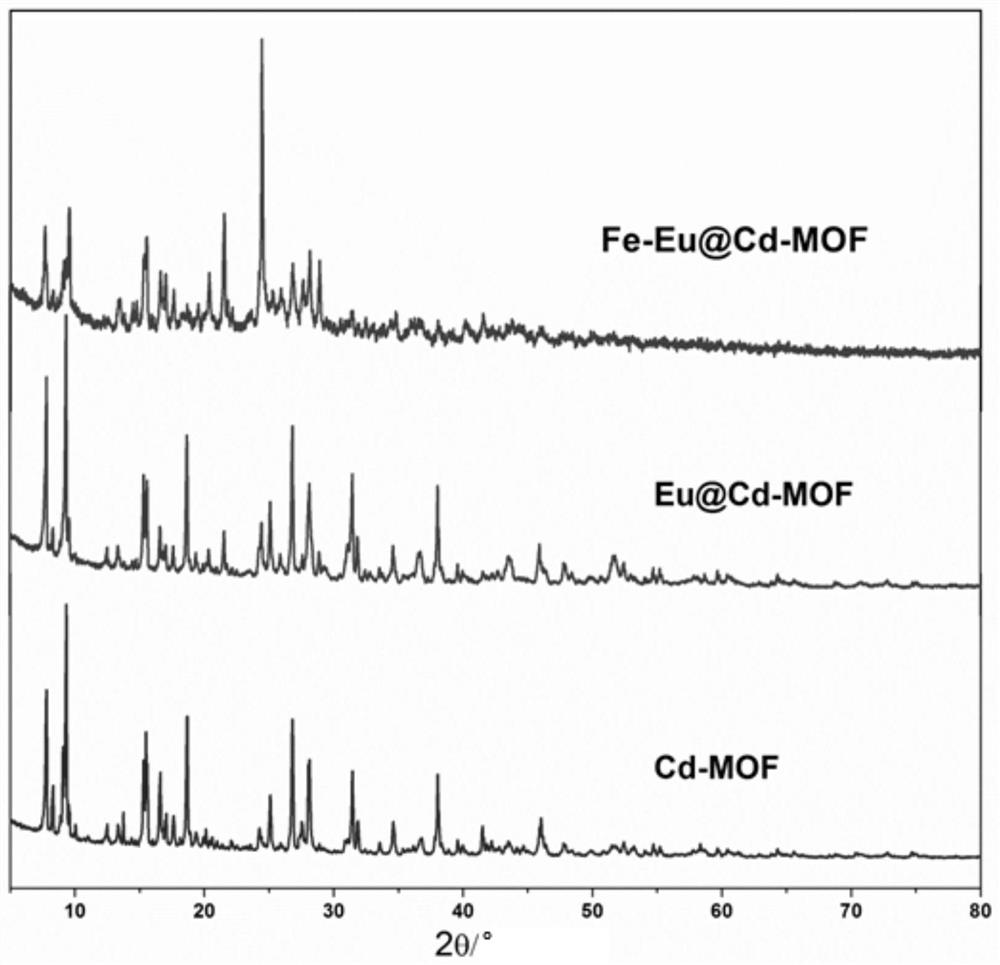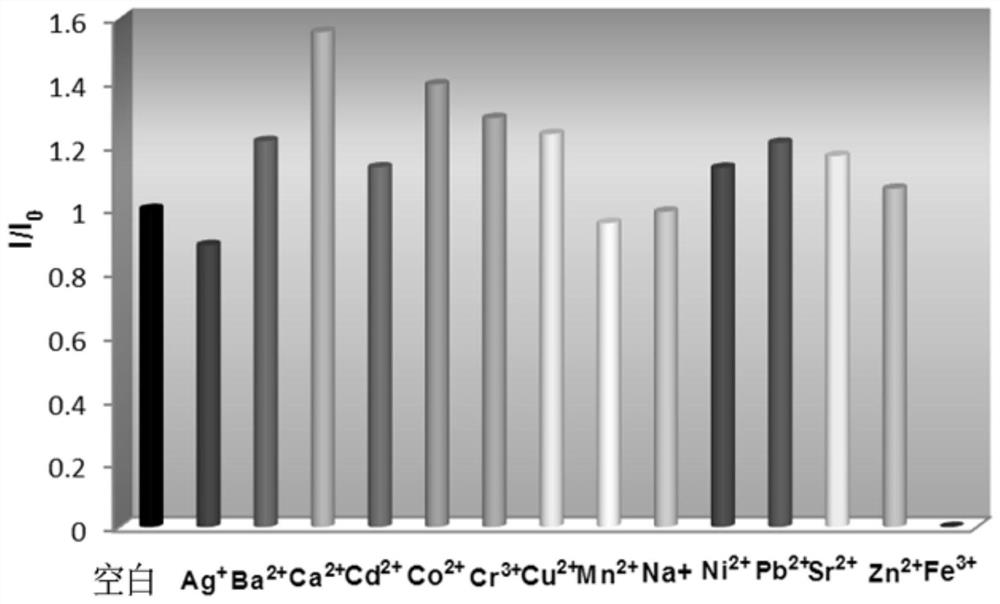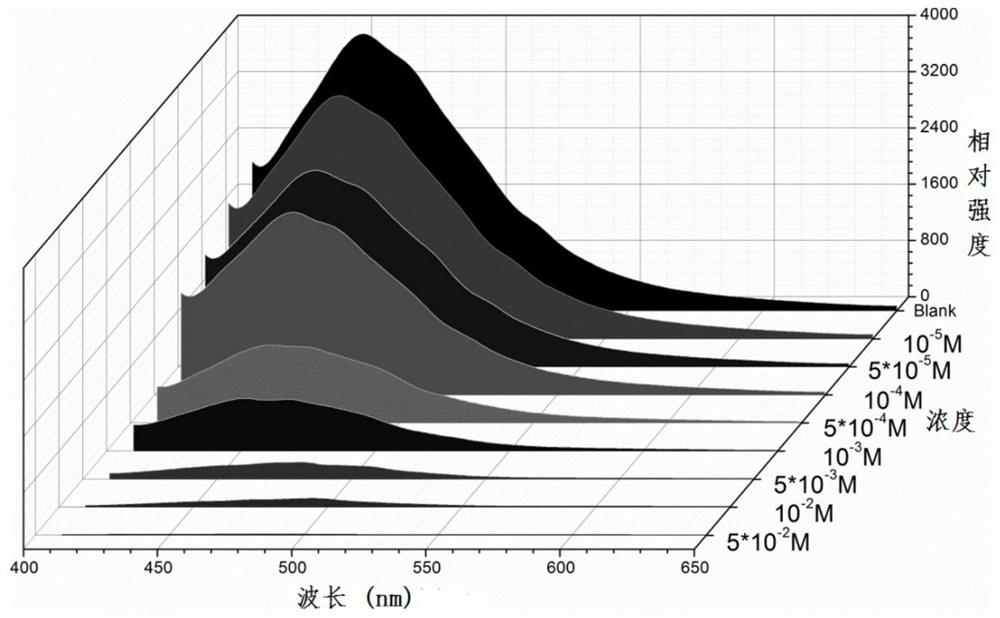A fluorescent probe for identifying iron ions in water, its preparation method and application
A fluorescent probe, iron ion technology, applied in the field of fluorescent sensors, can solve problems such as unfavorable promotion, high detection cost, use of large-scale instruments, etc., and achieve the effects of saving capital, high sensitivity, and short detection time
- Summary
- Abstract
- Description
- Claims
- Application Information
AI Technical Summary
Problems solved by technology
Method used
Image
Examples
Embodiment 1
[0022] (1) Weigh according to the mole ratio of 2,4,6-tris(4-pyridyl)-1,3,5-triazine (TPT) and 5-hydroxyisophthalic acid as 1:1, and after mixing, it becomes a mixed Ligand;
[0023] (2) According to Cd(NO 3 ) 2 .4H 2 Weighing Cd(NO 3 ) 2 ·4H 2 O;
[0024] (3) The reagents weighed in (1) and (2) were sonicated or stirred in DMA / H 2 O (where DMA and H 2 The volume ratio of O is 4:4) mixed and dissolved in 8 milliliters of solvent to prepare a precursor solution;
[0025] (4) The precursor solution obtained in (3) is transferred into a hydrothermal kettle, and subjected to a solvothermal reaction at 120° C. for 72 hours, followed by suction filtration, washing and drying to obtain a three-dimensional structure Cd-MOF material.
[0026] (5) 3 mg of Cd-MOF in (4) was added to 3 ml of 0.1 mol / L Eu(NO) 3 ) 3 The solution was stirred for 48 hours, filtered with suction, and dried to obtain Eu 2+ @Cd-MOF probe material.
[0027] Through X-ray powder diffraction, we charac...
Embodiment 2
[0030] Eu 2+ Synthesis and Application of @Cd-MOF Materials
[0031] (1) Weigh according to the mole ratio of 2,4,6-tris(4-pyridyl)-1,3,5-triazine (TPT) and 5-hydroxyisophthalic acid as 1:1, and after mixing, it becomes a mixed Ligand;
[0032] (2) According to Cd(NO 3 ) 2 .4H 2 Weigh Cd(NO 3 ) 2 .4H 2 O;
[0033] (3) Put the reagents weighed in (1) and (2) in DMA / H under ultrasonic or stirring 2 O (its volume ratio is 4:4) mixed and dissolved in 8 milliliters of solvents to prepare a precursor solution;
[0034] (4) Transfer the precursor solution obtained in (3) into a hydrothermal kettle, perform solvothermal reaction at 120°C for 72 hours, suction filter, wash, and dry to obtain a rod-like crystalline material Cd-MOF.
[0035] (5) Add 3 mg of Cd-MOF material in (4) to 3 ml of 0.1 mol / L Eu(NO 3 ) 3 solution, stirred for 48 hours, suction filtered, and dried to obtain Eu 2+ @Cd-MOF probe material.
[0036] By X-ray powder diffraction, we characterized the stabili...
PUM
 Login to View More
Login to View More Abstract
Description
Claims
Application Information
 Login to View More
Login to View More - R&D
- Intellectual Property
- Life Sciences
- Materials
- Tech Scout
- Unparalleled Data Quality
- Higher Quality Content
- 60% Fewer Hallucinations
Browse by: Latest US Patents, China's latest patents, Technical Efficacy Thesaurus, Application Domain, Technology Topic, Popular Technical Reports.
© 2025 PatSnap. All rights reserved.Legal|Privacy policy|Modern Slavery Act Transparency Statement|Sitemap|About US| Contact US: help@patsnap.com



